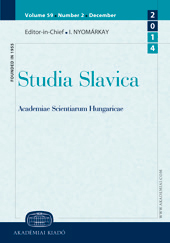Равнодушная природа как пушкинский мотив в романе Сергея Довлатова «Заповедник»
Indifferent nature as Pushkin's motif in the novel by Sergei Dovlatov "Sanctuary"
Author(s): Zsofia KalavszkySubject(s): Russian Literature, Theory of Literature
Published by: Akadémiai Kiadó
Keywords: 20th-century Russian prose; late modern-postmodern; Pushkin; intertextuality; motif analysis; creative process;
Summary/Abstract: My paper aims at examining the poetics of Sergei Dovlatov’s novel Sanctuary, with particular emphasis on motivic repetitions and the Pushkinian intertexts embedded in the novel. It reveals a complex relationship linking Dovlatov the author, Alikhanov the narrator, Alikhanov the protagonist and the narrative itself to Pushkin’s life, persona, his texts and language. By referring to two Pushkinian intertexts, I argue that Alikhanov’s understanding of Pushkin develops simultaneously as his relationship to his wife Tanya progressively becomes a text. Alikhanov recreates Pushkin’s ars poetica for himself by aphoristically identifying the poet with an indifferent nature. The fictional equivalent of this will be Tanya, whom Alikhanov the narrator describes with the attributes of indifference. This motif of indifferent nature establishes a connection between Pushkin’s lyrics and Dovlatov’s text. Pushkin, the greatest cultural subject in Russia’s collective memory, is salvaged by Dovlatov’s text through Alikhanov’s Tanya as well as the narrator’s own personal history; a history that necessarily evolves from Pushkin. Alikhanov the protagonist and Alikhanov the narrator interpret Pushkin in the context of their own crucial, existential questions, the questions of amorality and destiny, and the possibilities of late modern-postmodern prose writing.
Journal: Studia Slavica Academiae Scientiarum Hungaricae
- Issue Year: 56/2011
- Issue No: 2
- Page Range: 391-407
- Page Count: 17
- Language: Russian
- Content File-PDF

